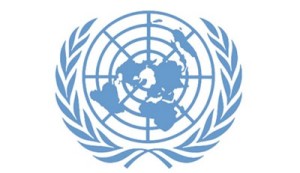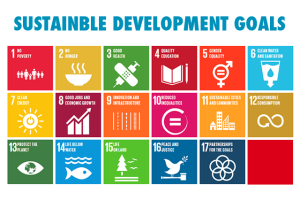 On June 14, 2016, people from non-governmental organizations (NGOs), faith-based organizations, corporations, universities, the Peace Corps, and United Nations Volunteers (UNV) came together at the Brookings Institution to answer the question on how to achieve impacts on the United Nations 2030 Sustainable Development Goals (SDGs) through international service. This was also the 10th anniversary gathering of the Building Bridges Coalition, a multi-stakeholder consortium of development volunteers, coordinated by Brookings. The event included the announcement of a new Service Year Alliance partnership with the coalition to step up international volunteers and village-based volunteering capacity around the world.
On June 14, 2016, people from non-governmental organizations (NGOs), faith-based organizations, corporations, universities, the Peace Corps, and United Nations Volunteers (UNV) came together at the Brookings Institution to answer the question on how to achieve impacts on the United Nations 2030 Sustainable Development Goals (SDGs) through international service. This was also the 10th anniversary gathering of the Building Bridges Coalition, a multi-stakeholder consortium of development volunteers, coordinated by Brookings. The event included the announcement of a new Service Year Alliance partnership with the coalition to step up international volunteers and village-based volunteering capacity around the world.
(note: in this case, the word development has to with humanitarian aid that is focused on building the capacities of humans for improved health, improved education, improved income generation, improved life choices, etc., on community development, institutional development, environmental development, country development, etc.)
According to a summary article about the events by David L. Caprara, “Volunteerism remains a powerful tool for good around the world. Young people, in particular, are motivated by the prospect of creating real and lasting change, as well as gaining valuable learning experiences that come with volunteering.”
Brookings Senior Fellow Homi Kharas, who served as the lead author supporting the high-level panel advising the U.N. secretary-general on the post-2015 development agenda, noted the imperative of engaging community volunteers to scale up effective initiatives, build political awareness, and generate “partnerships with citizens at every level” to achieve the 2030 goals.
Kharas’ call was echoed in reports on effective grassroots initiatives, including Omnimed’s mobilization of 1,200 village health workers in Uganda’s Mukono district, a dramatic reduction of malaria through Peace Corps efforts with Senegal village volunteers, and Seed Global Health’s partnership to scale up medical doctors and nurses to address critical health professional shortages in the developing world.
Civic Enterprises President John Bridgeland and Brookings Senior Fellow E.J. Dionne, Jr. led a panel with Seed Global Health’s Vanessa Kerry and Atlas Corps’ Scott Beale on policy ideas for the next administration, including offering Global Service Fellowships in United States Agency for International Development (USAID) programs to grow health service corps, student service year loan forgiveness, and technical support through State Department volunteer exchanges. There were also representatives from Global Citizen Year, America Solidaria, and International Young Leaders Academy.
The multi-stakeholder volunteering model was showcased by Richard Dictus, executive coordinator of UNV; Peace Corps Director Carrie Hessler-Radelet; USAID Counselor Susan Reischle; and Diane Melley, IBM vice president for Global Citizenship. Melley highlighted IBM’s 280,000 skills-based employee volunteers who are building community capacity in 130 countries along with Impact 2030—a consortium of 60 companies collaborating with the U.N.—that is “integrating service into overall citizenship activities” while furthering the SDGs.
The key role of colleges and universities in the coalition’s action plan—including linking service year with student learning, impact research, and gap year service—was outlined by Dean Alan Solomont of Tisch College at Tufts University; Marlboro College President Kevin Quigley; and U.N. Volunteers researcher Ben Lough of University of Illinois Urbana-Champaign.
These panel discussion produced a resolution that highlighted five major priorities:
- Engage service abroad programs to more effectively address the 2030 SDGs by mobilizing 10,000 additional service year and short-term volunteers annually and partnerships that leverage local capacity and volunteers in host communities.
- Promote a new generation of global leaders through global service fellowships promoting service and study abroad.
- Expand cross-sectorial participation and partnerships.
- Engage more volunteers of all ages in service abroad.
- Study and foster best practices across international service programs, measure community impact, and ensure the highest quality of volunteer safety, well-being, and confidence.
Caprara noted in his article, “Participants agreed that it’s through these types of efforts that volunteer service could become a common strategy throughout the world for meeting pressing challenges. Moreover, the cooperation of individuals and organizations will be vital in laying a foundation on which governments and civil society can build a more prosperous, healthy, and peaceful world.”
In addition, the Building Bridges Coalition produced a webinar on the role of volunteers in achieving the SDGs. Here is a slide show from the event, as well as the audio.
The Building Bridges Coalition is an all-volunteer 501(c)3 non-profit organization. The coalition encourages international volunteer organizations, large and small, to become members, as well as individuals interested in international volunteer service; there are fees associated with membership. As of the start of 2016, the BBC has seven working groups addressing the issues of greatest interest to coalition members.


